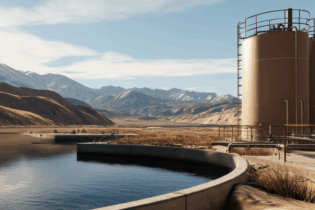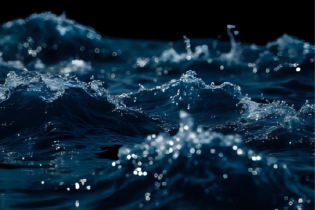The individual largely responsible for developing the revolutionary Nereda® aerobic granular sludge wastewater treatment technology, Professor Mark van Loosdrecht from the University of Delft in The Netherlands, is to receive the Lee Kuan Yew Water Prize for 2012 in recognition of his contributions to sustainable wastewater purification. The prize will be presented during the Singapore International Water Week in July.
Nereda® SSI Engineers & Environmental Consultants (part of the DHV Group that transferred Nereda into an internationally applied technology) completed the first full scale Nereda® demonstration plant at Gans Bay in the Western Cape in 2009. The plant, which won for SSI the SAICE Technical Excellence Award in 2009, has been operating trouble free and as designed, for three years. SSI reports that construction on the second South African Nereda® plant has started at Wemmershoek in Stellenbosch. Nereda® wastewater plants are much more energy efficient, take up to 75% less space(because conventional large sedimentation tanks are no longer necessary), use no chemicals, produce cleaner effluent, are easy to operate and fully automatic in operation while monitored – a characteristic that addresses the major problem area of plant operation found throughout South Africa. The Nereda® aerobic granular sludge process is based on a group of microorganisms that convert waste materials into harmless substances. In conventional purification processes, these microorganisms form flakes that can only gradually be separated from the purified water. In the Nereda® process however, the bacteria form compact sludge granules which quickly sink to the bottom. These compact granules result in a spectacular increase in the processing speed of the reactor. Anammox Professor Van Loosdrecht has secured the prize primarily for his work on the development of an innovative biological process which can purify wastewater in a way that is relatively inexpensive, robust and sustainable. This process, known as Anammox, involves a reduction in energy consumption, carbon dioxide emissions and the amount of chemicals required.Granular sludge
Van Loosdrecht was closely involved in the construction of the first Anammox demonstration plant in Rotterdam. By 2011, there were eleven Anammox plants in operation, and a variation on the process is being used in more than thirty other plants. In addition to Anammox, the award is also in recognition of Van Loosdrecht’s work on the development of other technologies, including Sharon, BABE and especially the aerobic granular sludge, Nereda®. Van Loosdrecht explains: “Nereda and Anammox are both granular sludge technologies. Granular sludge technology is a Dutch development, pioneered by Delft alumnus Professor Gatze Lettinga.” International breakthrough Nereda technology is set to revolutionise the way wastewater is treated. Various industrial installations are already operating in the Netherlands and there are full-scale demonstration systems for domestic wastewater in Portugal and South Africa. Recently, the first full-scale system for domestic wastewater purification was commissioned by the Veluwe Water Board. A large number of systems are in development, in addition to the Stellenbosch, Wemmershoek plant, at the Rijn and IJssel and the Regge.





